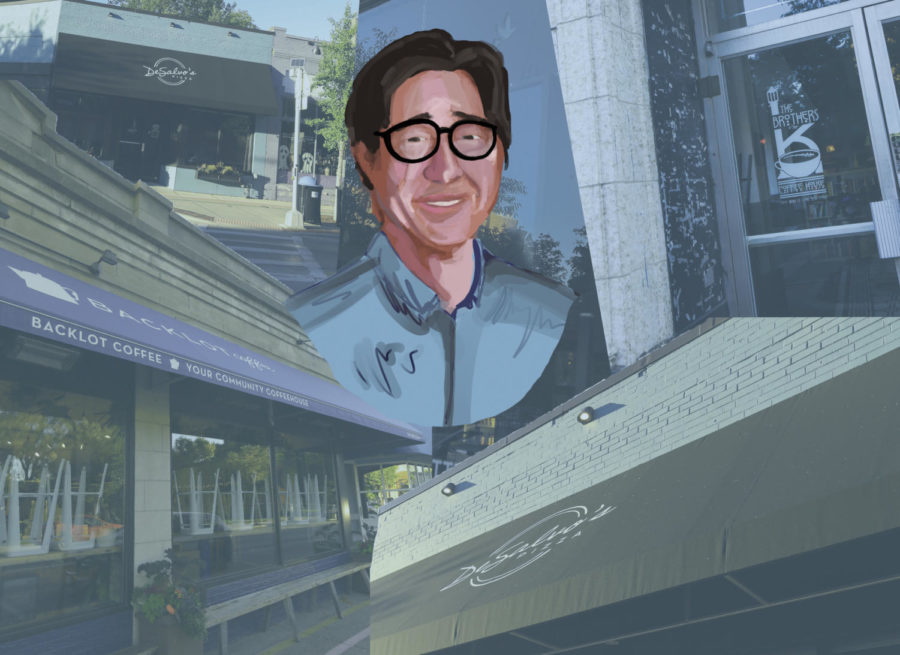Serving validation, connection … and caffeine!
Clusters of teenage girls collect at the tables in the corners, their notebooks and computers strewn across the furniture as they type and talk simultaneously. Nearly every seat in the cafe is filled; by tired college students typing furiously, backs bent over messily scrawled notes and textbooks; or friends catching up over steaming drinks, their legs crossed beneath them as they clamor to share their stories. A mom with her hand clasped around her son lets him have a sip of her beverage—to which he wrinkles his nose—and an older woman balances a large purple orchid on one arm while clutching her iced green tea in another.
Customers in line muse over what drink they should order—the oatmeal cookie latte or the cardamom rose—and ponder which donut would go with it best. From the speakers, songs that range from smooth, soft jazz to Bruno Mars and Marvin Gaye waft through the air; along with the sound of clinking glass plates and the hiss of an espresso machine, though it’s nearly drowned out by people’s voices as they eagerly chatter. Even on a simple Wednesday afternoon, it’s easy to see that Backlot serves as a hub for its neighborhood; a collection of people young and old alike come here to enjoy each other’s company, or simply for a hot drink and welcoming atmosphere. It’s clear that Backlot’s patrons represent a snapshot of the community.
But communities are constantly evolving, which makes it easy for large chain enterprises to swoop in and disrupt the uniqueness of such places. Local businesses are an instrumental part of the distinctive character that defines those communities and makes them original. Local businesses provide individuality to a community. They reflect the values of a specific community, and the people who are part of it. They provide safe, comfortable places for people to gather, while also protecting the aspect of ingenuity.
As someone who runs several self-made businesses in a progressive community like Evanston, John Kim has shown how restaurants, cafes and shops can shape and ultimately influence the people they serve. From coffee shops to plant stores to pizzerias, Kim has covered just about every neighborhood in Evanston with his local businesses, heavily impacting the makeup of storefronts and the people of Evanston alike.
Opened in 2005, Kim’s first coffee shop, The Brothers K, located on 500 Main Street, was just the beginning of Kim’s up-and-coming business ventures. Kim is the co-owner of this long standing Evanston staple, which he started with his brother and business partner, Brian Kim.
“I think being able to open my first business with my brother is something that’s special,” Kim shares. “It feels good that we were able to start something together and continue to do things together.”
From there, Kim’s entrepreneurial insights only continued to grow with the opening of the Other Brother Coffeebar in 2011. Three years later, Kim established Boltwood with partner Brian Houston, which functioned as a popular, family-friendly restaurant until its closing in 2019. In 2015, Kim and Isaac Bloom opened Backlot Coffee on 2006 Central Street. Kim’s businesses were expanding largely and rapidly, and Evanston provided all the room to grow.
Unfortunately, the Other Brother Coffeebar closed in 2020, but Kim’s other businesses continued to evolve. From there, he opened Plant Shop Evanston last year, in partnership with the folks from Plant Shop Chicago. Most recently, Kim partnered with Alex DeSalvo to open DeSalvo’s pizza, just across the street from Backlot Coffee.
“John is one of our partners here at DeSalvo’s and more than anything, he has been an ear and a sounding board,” DeSalvo says. “As someone who had been through many openings in the past, he knew his way around the city and in a lot of ways, has been the advisory role.”
Not only do Kim’s establishments hold significance for Evanston storefronts and those that seek a sense of community in these spaces, but the names carry meaning as well. The label ‘The Brothers K’ was partially inspired by the book ‘The Brothers Karamazov’, because their last name begins with ‘K’ and they are brothers. ‘The Brothers Karamazov’, though, written by Fyodor Dostoevsky, tells the story of a dysfunctional family and their struggles in 19th century Russia. The ‘Other Brother Coffeebar’ was a spin off of ‘The Brothers K’ since Kim ran it alone.‘Boltwood’ was a former principal in the early days of ETHS, as well as the title of one of the wings of the school before they were refurbished. Backlot Coffee is a reference to an Evanston neighborhood called ‘the backlot’.
“[The backlot neighborhood] is kind of a community within a community, and that’s essentially what we feel a coffee house is. So we named it Backlot,” Kim says.
Though it’s obvious Kim has had entrepreneurial ideas brought to fruition, and suitable names that do them justice, an occupation in business wasn’t always what Kim had in mind for himself.
“I think failing at other things [influenced me to start my own business]. I was studying to become a pastor, and I soon realized that it was not really what I wanted to do, so I went back into the world of finance, which is what I graduated with in undergraduate school but was pretty unhappy,” Kim shares.
At the time, coffee-central companies like Starbucks and Metropolis were beginning to take off. The local coffee house was starting to come back alive again, Kim says. As they switched out their machines for ‘super automatic’ ones, the ‘third wave of coffee’, as Kim called it, was picking up as well.
“I was sitting in a coffee shop in Evanston one day and a buddy of mine kind of tongue-in-cheek said, ‘Why don’t you open a coffee shop? So I called [Brian],” Kim shares. “And we opened up a coffee shop.”
Although entrepreneurship wasn’t always the career path that Kim imagined he’d pursue, restaurant ownership has proved to be a worthy feat.
“I love people. I love communities. And I love serving communities. I think the world of hospitality is creating spaces where people can congregate and come together and share a common experience. The local coffee house [serves as just that]; a bunch of different people coming in for a bunch of different reasons, [yet] they’re all sharing a similar space and a similar experience, but doing it in their own ways,” Kim shares. “There’s something nourishing about going into a restaurant that you’re familiar with and getting to know the other people and regulars that go there. There’s just something [about] community building and the world of hospitality that attracts me.”
DeSalvo can attest that Kim has been successful in serving the communities, and creating spaces that offer such conviviality. “One thing that’s very true about John is his ability to make people in the community feel welcome and validated and seen. John has the ability to make everyone feel like they’re his dear friend,” DeSalvo says.
For restaurant owners, location can ultimately determine the fate of the establishment. It dictates the outward image of one’s company, and how many customers it might attract. Kim, along with others that have chosen to conduct their small businesses in Evanston, saw the appeal in bringing their businesses to the Evanston locale, creating a close-knit feeling and diversifying the blocks. “I think restaurants that are in a neighborhood for an extended amount of time create anchor spaces [for locals]. And whenever you walk through any given neighborhood, you can tell the places that are important to that neighborhood, and they generally look and feel like that neighborhood,” Kim says. “It’s fun to be able to be a part of that landscape here in Evanston.”
Despite loving his job for a variety of other reasons, having a lifestyle that isn’t bound to 9 to 5 is also a refreshing aspect of the job for Kim, who has become successful enough to not have to personally oversee each establishment he owns. While he starts most of his mornings at Backlot Coffee, working and interacting with employees and customers, he has the freedom to come and go as necessary. Being able to dictate his own schedule in certain ways, maintain his hobbies and being able to be at home with his kids and wife are what makes it all worthwhile, Kim says.
“After the mid-morning rush [at Backlot], I’ll head home and [then] I’ll head to the beach with my dog and spend, like, an hour there. I’ll go back home, and then check in at Backlot again. Some days, I’ll pop across the street and hang out at DeSalvos. Other days, I’ll be in the basement at Backlot doing paperwork. But usually my day ends by the time my kids are done with school and [I’ll] come home, start making dinner, hang out with them, and truck them around to all their different activities,” Kim says. “And then I go to bed early and do it again.”
And while owning a plethora of businesses has paid off, it doesn’t come without a handful of challenges. From plumbing faults to broken refrigerators to sick employees, restaurant ownership has its fair share of obstacles even without a pandemic to factor in.
“I think the challenges are always being flexible to whatever is going to be thrown at you. No day really looks the same.” Kim says. “But you figure it out. You figure out how to keep the machine rolling. And you make that happen.”
In COVID-19, Kim encountered one of the largest obstacles that a business owner could face.
“I think COVID taught us to be flexible,” Kim says. “It taught us to be adaptable. And I think it was an opportunity for the neighborhood to be able to say, ‘these are the things that are important to us. And we want to make sure that they’re still around when this is all said and done.’ And it was—we grew during COVID because we were determined to stay open and the neighborhood was around to be able to say okay, let’s continue to support these businesses.”
But even after all the hardships that come with owning your own business (or owning several businesses, in Kim’s case), restaurant ownership is an admirable career, and Kim is proud to have followed it himself. For aspiring entrepreneurs, Kim shares a few words of encouragement:
“Be patient. Be comfortable with the process. I think it’s be[ing] comfortable with [the fact that] what you had in mind [is] not necessarily what happens. So it’s [finding] a comfort in change. Because best made plans are seldom what actually ends up happening.”
Kim acknowledges that his situation is unique. Not everyone gets to follow the same path he did, to the same successful destinations or are able to contribute to a community like Evanston. Because of him, and the work he’s put into making the city’s neighborhoods a place like no other, citizens of Evanston and those who pass through town have the pleasure of experiencing Kim’s establishments. Not only do the people of Evanston and others alike recognize and appreciate Kim and his work, but Kim attests to it as well.
“I feel like I’m a lucky guy. I’m able to live and work in a place that is my neighborhood. I recognize that this is a really wonderful thing and I’m thankful for it.”
Your donation will support the student journalists of the Evanstonian. We are planning a big trip to the Journalism Educators Association conference in Nashville in November 2025, and any support will go towards making that trip a reality. Contributions will appear as a charge from SNOSite. Donations are NOT tax-deductible.











